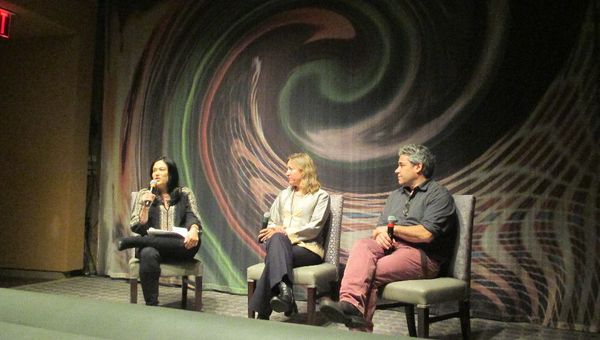 |
| Barbara Kopple in conversation with E-Team directors Katy Chevigny and Ross Kauffman at the Core Club: "You were in a situation that probably put you in great danger." Photo: Anne-Katrin Titze |
While DOC NYC's opening night screening of David Thorpe's Do I Sound Gay was going on downtown, Barbara Kopple (Running From Crazy and Harlan County U.S.A.) was hosting a conversation with E-Team directors Katy Chevigny and Ross Kauffman uptown at the Core Club. D.A. Pennebaker and Chris Hegedus, who are receiving Lifetime Achievement Awards together with Albert Maysles, were among those attending the reception and screening.
Last month, I spoke with the first Chief Prosecutor of the International Criminal Court, Luis Moreno Ocampo about his role in pursuing justice. The E-Team is another important force in collecting evidence to bring to light ongoing violations of human rights.
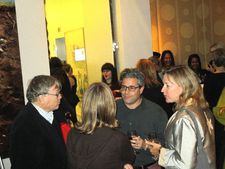 |
| D.A. Pennebaker and Chris Hegedus speak with Ross Kauffman and Katy Chevigny at the E-Team reception Photo: Anne-Katrin Titze |
E-Team stands for the Emergency Team of the Human Rights Watch. Chevigny and Kauffman follow four prominent members, Anna Neistat, Ole Solvang, Fred Abrahams and Peter Bouckaert in action as they enter hostile regions such as Syria and Libya to report on abuses.
Barbara Kopple: I'm so moved by this film and how you found these characters who are all so human and who care so much. The film was practically seamless, I was on the edge of my chair watching it. So I'd like to hear from you guys how this came about.
Katy Chevigny: Ross and I were looking for a project to work together. It wasn't really until we met the E-Team, these particular characters you just saw. Several years ago, Ross and I had dinner here in Manhattan with Anna and Ole and Fred and Peter. Their bosses weren't there, the heads of Human Rights Watch weren't there. It was just them and us. At the end of the dinner, Ross and I really felt like we had just met some characters from a movie. That was the first spark that made us want to make the film.
Ross Kauffman: It was like a great blind date.
Kopple: What were the risks you knew you had to take? Did you have to train to go out there? You were in a situation that probably put you in great danger.
Kauffman: I mean, it's funny when you go into these situations, you want to make sure that you're with the right people. You want to make sure that you're not with cowboys, people who just run into a war zone and not really think about the risk. They [the E-Team] were very clear, like, "listen, we weigh the risks with the reward, we don't just go to the front line." We knew we were in the best hands, even though anything could happen.
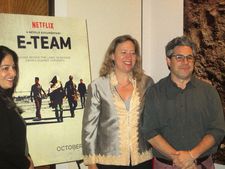 |
| Producer Marilyn Ness with E-Team directors Katy Chevigny and Ross Kauffman Photo: Anne-Katrin Titze |
Chevigny: The one thing we did know in advance was that we wanted to film with them at home and not just in the field. They were kind of surprised for a minute, like "why do you need to film us having dinner, again?" It's great to be in a room with all these great documentary filmmakers like yourself [Kopple], like Chris [Hegedus] and Penne [D.A. Pennebaker]. We are very influenced by that idea that you got to see them [E-Team] as people. It's not just about a newsroom.
Kauffman: One of the best compliments we had at the end of the filming for two and a half years. Anna said, "you guys are never going to finish this movie. You're just here in Paris to enjoy Paris. You just want to get away from your family and your responsibilities." That's beautiful. That was a great compliment!
Kopple: You two became parents also during the course of this film.
Kauffman (pointing to the front row): My wife is right there!
Kopple: There must have been a bonding between you and Anna [who is also pregnant during the filming] about what it means to take these risks, what it means to leave your family.
Kauffman: Katy had a baby. My wife had a baby. All four main characters in the film had a baby. A very fertile film. It did help with that bond. I love what you're saying. It definitely made us more empathetic in a way. War, in the end, is all about how it breaks up families.
Kopple: How has doing this film affected your lives? You've really done a film that has much power and destruction and killing.
Chevigny: We are still figuring this out. The film is still out in the world. We are just filmmakers and we are making a film about people who are doing work that's on a whole other level. They are intervening in a way that has got severe political consequences. In some way, that is the luxury and the privilege of being a documentary filmmaker - to make films about people who are doing something that is beyond us to a certain extent.
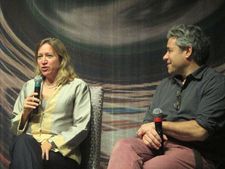 |
| Katy Chevigny with Ross Kauffman: "The one thing we did know in advance was that we wanted to film with them at home and not just in the field." Photo: Anne-Katrin Titze |
Kopple: But it changes you - to know that you could be killed, to see the sights that you filmed, to hear the suffering of the people - it stays with you.
Kauffman: It is a privilege, not just to be friends with the E-Team. To meet all the people on the ground in Syria and Libya - they are going through this every single day. To meet them and become friends with them and know them as people, not just victims.
Chevigny: Just the way nihilism can be infectious, if people are optimistic about the ability to make change, you know, it makes us feel that way as well… They do get some death threats but that is kind of the beauty of Human Rights Watch - their whole model is essentially transparency. The example of smuggling across the border is actually the exception to the rule. They are in the news all the time. Human Rights Watch has a staff of 400, there's other people, researchers on the ground, who live, let's say in Beirut, and work in the region, who can do work the E-Team can't in those kinds of situations.
Kauffman: Jim Foley was one of our cinematographers. He was abducted in Libya, then he was released. I met Jim while I was filming Peter in Libya. He literally walked in my frame. We hired Jim and he did a great job and then he went missing on another assignment. And two years later he was murdered [Foley was beheaded by ISIS in August 2014].
Kopple: What was Jim like?
Kauffman: He was a lovely guy. He was positive. Positive energy. He sort of fit into the mold of this film. One of the things about this film that we love is that there's humour and there's joy and there's love. He sort of emanated that. We only met him a couple of times, quite frankly. Peter was great friends with him. Hopefully the film is in honour to the work he committed his life to.
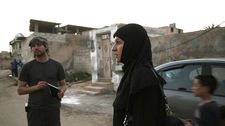 |
| Ross Kauffman on the E-Team: "They were very clear, like, 'listen, we weigh the risks with the reward, we don't just go to the front line.' We knew we were in the best hands…" |
Chevigny: Right now, there is no E-Team work, no Human Rights Watch working in Syria itself because it's just too dangerous. However, Fred did go in September to Northern Iraq and interviewed a bunch of refugees and talked about massacres that ISIS had done against women and children. Fred is also working on studying, documenting the abuses by the Iraqi government against ISIS.
That's the Human Rights Watch way - find the safest possible way not to endanger their own staff, talk to refugees to try to talk about what both sides are doing that are violations of International law…There's a great film out this year about Roger Ebert, Life Itself that Steve James made. Ebert said about films that they were "empathy machines," good films are empathy machines. Hopefully that's what our film does. That's our job. To make the connection.
DOC NYC Film Festival screenings: Short List - 4:45 PM, Tue. Nov 18, 2014 - Bow Tie Chelsea Cinemas - 7:00 PM, Thu Nov 20 - IFC Center; Scheduled to appear on November 20: Directors Katy Chevigny and Ross Kauffman
DOC NYC will admit Academy of Motion Picture Arts and Sciences members and a guest to any film screening in the festival’s “Short List” section, space permitting. AMPAS members will need to present their membership card at the box office to claim a ticket.





















